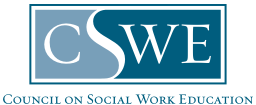DSW Program of Study

Low-Residency Curriculum
DSW students complete 50 credit hours of doctoral-level course work.
Our Doctor of Social Work curriculum is offered in a low-residency format — all courses are taught with online synchronous and asynchronous instruction where you’ll engage in meaningful discussions and faculty-led experiences. Students can complete their degree in two years.
Course Descriptions
Fall Year 1
SW 802: Scholarly Writing, Positionality, and Epistemology (5 credit hours)
This course aims to teach students how to use scholarship and effective scholarly communication to improve academic and professional writing. Students are introduced the Publication Manual of the American Psychological Association (APA), which is a program requirement for all written assignments. In addition, students will understand how to broadly search for scholarly literature and critique scholarly articles. Content includes scholarly inquiry on what is knowledge, why knowledge is valuable to us and the sources of knowledge we consider to be legitimate, as well as how our social identities contribute to and shape knowledge.
SW 803: Innovative Practices for Justice and Social Change (5 credit hours)
This course focuses on both conventional and contemporary theories of leadership and social change to advance effective social work practice at micro, mezzo and macro levels. Students will learn why and how power relations inform professional social work practice and broader society. Content includes feminisms, indigenous ways of knowing, transformative and transgressive leadership and justice.
Spring Year 1
SW 804: Advanced Macro Practices (5 credit hours)
This course examines anti-racist, anti-oppressive and social justice-oriented practices in agency and community contexts. Discussion will occur on the importance of decolonizing and dismantling existing power structures at the global, national, state and local. Topics include community practice and organizing, abolitionist and reparatory practices, and policy advocacy.
SW 805: Advanced Mezzo Practices (5 credit hours)
This course is designed to enhance the administrative, management and supervisory skills necessary for effective and ethical leadership practice in a variety of settings. Content advances community-centered ways to meet the social, economic and environmental needs of people.
Summer Year 1
SW 806: Advanced Micro Practices (5 credit hours)
This course covers organizing, planning, assessment, intervention and evaluation of micro social work practices, as well as strategies for collaboration, consultation and critique of micro social work practices using anti-racist considerations and professional social work ethics. Content includes contemporary and traditional healing practices.
SW 807: Grants and Financial Management (5 credit hours)
This course covers organizing, planning, assessment, intervention and evaluation of micro social work practices, as well as strategies for collaboration, consultation and critique of micro social work practices using anti-racist considerations and professional social work ethics. Content includes contemporary and traditional healing practices.
Fall Year 2
SW 808: Teaching in Social Work (5 credit hours)
This course focuses on teaching in schools of social work. Students learn about adult learning theories, planning course curriculum and objectives, instructional design and technology, assessment of student learning outcomes, and CSWE accreditation. Students discuss how this information may be applied to social work education. However, the knowledge and skills in this course may be transferable to career paths outside academia.
SW 809: DSW Capstone I (5 credit hours)
This course initiates the capstone process. Students submit and defend their capstone proposal for their capstone project leading to the DSW degree as agreed upon per the student and capstone instructors. Capstone projects must include an original research project completed from start to finish. The project should advance practice at micro, mezzo and/or macro levels, as well address higher education and/or professional leadership. The underpinnings of the project must include anti-oppressive, anti-racist and social justice aims. Capstone projects must be approved prior to student registering for SW 810 and SW 811.
Spring Year 2
SW 810: Research for Advanced Social Work Practice (5 credit hours)
This course focuses on advanced quantitative and qualitative data analytic techniques. Students will further develop an individualized plan of study for their final capstone project leading to the DSW degree. Content includes a comprehensive review of the major concepts of the research process, research ethics and methods for implementing projects. Prerequisite is satisfactory completion of SW 809.
SW 811: DSW Capstone II
This course finalizes the capstone process. Students submit and defend their capstone project as agreed upon by the Capstone instructors during SW 809. DSW students will submit and present a Capstone Project as a Qualifying Exam (i.e., Oral and Written Comprehensive examinations). The qualifying exam will include written submission of the Capstone Project and an oral presentation of an abbreviated version of their Capstone Project. Prerequisites are satisfactory completion of SW 809 and 810.
Accreditation

Spalding University’s School of Social Work is accredited by Council of Social Work Education (CSWE) for the Bachelor of Science in Social Work and Master of Science in Social Work programs, while the Doctor of Social Work program is accredited by SACSCOC.

Upcoming Events
- March 17 @ 6:00 pm - 7:00 pm
Virtual Info Session: DSW